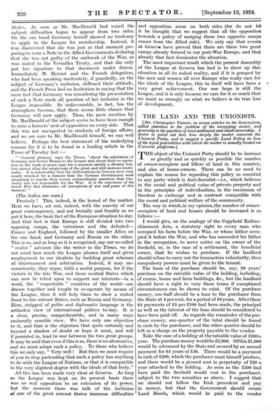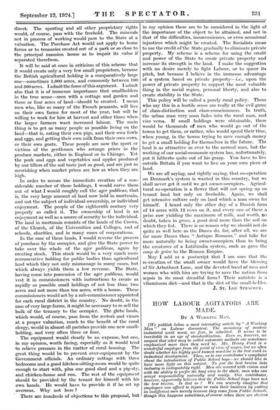THE LAND AND THE UNIONISTS.
[Mr: Christopher Turnor, in recent articles in the SPECTATOR, called attention to the problem of the occupying owner, and generally to the question of land settlement andsmall ownership. I desire to point out here how deeply the matter concerns the Unionist Party, and to suggest a specific Land Policy in lieu of the tepid generalities with which the matter is- usually treated on Unionist platforms.] 4 object of the Unionist Party should be to increase as greatly and as quickly as possible the numbei of owner-occupiers- and tillers of land in this country, and also of house-owners. There can be no need to explain the reason for regarding this policy as essential to any party which is Anti-Socialist—i.e., which believes in the social. and political value of private property and in the: principles of individualism, in the maximum of freedom in exchange and in contract compatible with the moral and political welfare of the community.
The way in which, in my opinion, the number of owner- occupiers of land and houses should be increased is as follows :— I would give, on the analogy of the Copyhold Enfran- chisement Acts, a statutory right to every man who occupied his farm before the War, or whose father occu- pied it before the War, and who has succeeded his father in the occupation, to serve notice on the owner of the freehold, or, in the case of a settlement, the beneficial owner, that he wishes to purchase. If the• landlord should refuse to carry out the transaction voluntarily, then - compulsory powers must be given to the tenant.'
The basis of the purchase should be, say, 20 years' purchase on the rateable value of the holding, including, of course, house and farm buildings, &c., but the landlord should have a right to vary these terms if exceptional circumstances can be shown to exist. Of the purchase money, one-half should be a loan to the purchaser from the State at 4 per cent. for a period of 64 years. After these 64 payments of £4 per £100 had been made, the principal as well as the interest of the loan should be considered to have been paid off. As regards the remainder of the pur- chase money, one-quarter of the total should be found in cash by the purchaser, and the other quarter should be left as a charge on the property payable to the vendor.
Take the case of a holding at the rateable value of £100 a year. The purchase money would be £2,000. Of this £1,000 would be advanced by the State and secured by an annual payment for 64 years of £40. There would be a payment in cash of 1500, which the purchaser must himself produce, . and there would be a ground rent in perpetuity of £20 a year -attached to the holding. As soon as the £500 had been paid the freehold would vest in the purchaser, subject to the two annuities as above. I suggest that we should not follow the Irish precedent and pay in money, but that the Government should create Land Bonds, which would be paid to the vendor direct. The sporting and all other proprietary rights would, of course, pass with the freehold. The minerals not in process of working would pass to the State at a valuation. The Purchase Act would not apply to home farms or to tenancies created out of a park or so- close to the principal mansion house as to impair its value if separated therefrom.
- It will be said at once in criticism of this scheme that it would create only a very few small proprietors, because the British agricultural holding is a comparatively large one—sometimes 1,000 acres, and commonly between 100 and 500 acres. I admit the force of this argument. I admit also that it is of immense importance that smallholders in the true sense—men with a cottage and garden and three or four acres of landshould be created. I mean men who, like so many of the French peasants, will live on their own farms for most of the year, but will be willing to work for hire at harvest and other times when the larger farmers want increased labour. The main thing is to get as many people as possible living on the land—that -is, eating their own pigs,- and their own fowls and eggs, and getting their own milk from their own cows, or their own goats. These people are now the sport or victims of the gentlemen who arrange prices in the produce markets, either in England or in Chicago. Yet the pork and eggs and vegetables and apples produced by our tillers of the soil taste just as good, and are just as nourishing when market prices are low as when they are high.
In order to -secure the immediate creation of a con- siderable number of these- holdings, I would carve them out of what I would roughly call the ager publicus, that is, the very large amount of land now held in mortmain, and not the subject of individual ownership, or individual enjoyment. The people of the eighteenth century very properly so called it. The ownership of land is an enjoyment as well as a source of security to the individual. The land in mortmain consists of the lands of the Crown, of the Church, of the Universities and Colleges, and of schools, charities, and in many cases of corporations.
In the case of these lands, I would reverse the process of purchase by the occupier, and give the State power to take over the whole of the alter publicus, again by creating stock. This stock would be a very much more remunerative holding for public bodies than agricultural land which they not only mismanage in many cases, but which- always yields them a low revenue. The State, having come into possession of the ager publicus, would vest it in commissioners- with instructions to create as rapidly as possible small holdings of not less than two acres and not more than-ten acres, with a house. These commissioners would act by a sub-commissioner appointed for each rural district in the country. No doubt, in the case of very large. arms, it might be necessary to re-sell the bulk of the tenancy- to the occupier. The glebe lands, which •would, of course, pass from the rectors and vicars at a proper valuation, much to the benefit of the rural clergy, would in almost all parishes provide one new small- holding, and very often three or four.
The equipment would clearly be an expense, but one, in my opinion, worth facing, especially as it would tend to relieve-pressure in the matter of rural housing. The great thing would be to prevent over-equipment by the Government officials. An ordinary cottage with three bedrooms and a. good kitchen-sitting-room would be quite enough to start with, plus one good shed and a pig-sty, and chicken-house and run. The rest of the equipment should be provided • by the tenant for himself with his own hands. He would have to provide it if he set up overseas. Why not here ?
There are hundreds of objections to this proposal, but in my opinion these are to be considered in the light of the importance of the object to be attained, and not in that of the difficulties, inconveniences, or even occasional injustices which might be created. The Socialists mean to use the credit of the State gradually to eliminate private property. My scheme is a scheme for using the credit and power of the State to create private property and increase its strength in the land. I make the suggestion with no desire merely to fight Labour, or to queer its pitch, but because I believe in the immense advantage of a system based on private property—i.e., upon the power of private property to support the most valuable thing in the social region, personal liberty, and also to create stability in the State.
This policy will be called a purely rural policy. Those who say this in a hostile sense are really at the evil game of class-distinction and class-consciousness. In truth, the urban man very soon fades into the rural man, and vice versa. If small holdings were obtainable, there would be thousands of men who would go out of the towns to get them, or rather, who would spend their time, when young, in the towns trying to save enough money to get a small holding for themselves in the future. The land is as attractive as ever to the normal man, but the working of our social-economic system has, unfortunately, put it hitherto quite out of his grasp. You have to live outside Britain if you want to live on your own piece of land.
We are all saying, and rightly saying, that co-operation on Denmark's system is wanted in this country, but we shall never get it until we get owner-occupiers. Agricul- tural co-operation is a flower that will not spring up on tenant land but only on freeholds. Again, we shall get intensive culture only on land which a man owns for himself. I heard only the other day of a Danish farm of 14 acres with 12 cows on it, and every one of these a prize cow yielding the maximum of milk, and worth, no doubt, taken in gross, a good deal more than the soil on which they fed. There is no reason why we should not do quite as well here as the Danes do, for, after all, we are far more Danes than " Antique Romans," and take far more naturally to being owner-occupiers than to being the creatures of a Latifundia system, such as gave the coup de grace to the Roman Empire.
May I add as a postscript that I am sure that the re-creation of the small owner would have the blessing of Sir Arbuthnot Lane, and the devoted band of men and women who with him are trying to save the nation from sepsis in its most dreadful form? Their antidote is a vitaminous diet—and that is the diet of the small-holder.
J. ST. Lon STRACHEY.



































 Previous page
Previous page